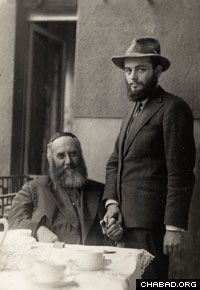|
Volume of Letters Reveals Details of Rebbe’s Pre-World War II Years
|
Adar I 20, 5771 · February 24, 2011
|
|
|
|
 |
| A
photograph of the Sixth Lubavitcher Rebbe, Rabbi Yosef Yitzchak
Schneersohn, of righteous memory, and his son-in-law, the future Rebbe,
Rabbi Menachem M. Schneerson, of righteous memory. |
A new volume of correspondence belonging to the Sixth Lubavitcher
Rebbe, Rabbi Yosef Yitzchak Schneersohn, of righteous memory, sheds new
light on the Berlin and Paris lives of his daughter and the son-in-law
who would succeed him, particularly the increasing push by the Jewish
leader for his son-in-law to assume ever more vital and public roles.
The years preceding the 1940 arrival in New York of Rebbetzin Chaya
Mushka Schneerson and the future Rebbe, Rabbi Menachem M. Schneerson, of
righteous memory, had not until recently revealed little in the way of
primary sources dealing with the scholarly back and forth between the
Sixth Rebbe and his son-in-law and the latter’s courtship of the
Rebbetzin.
But the release of the 15th volume of the Sixth Rebbe’s letters by
the Kehot Publication Society, the publishing arm of Chabad-Lubavitch,
opens a door on a trove of correspondence discovered in just the past
several years at the Rebbe and Rebbetzin’s home three blocks from
Lubavitch World Headquarters in Brooklyn, N.Y. The new volume offers 303
of those letters, taking care to omit correspondence dealing with the
Sixth Rebbe’s medical care and his financial transactions.
What emerges is a fascinating story beginning with the meeting of two
distant cousins, progressing to the suggestion of the young Rabbi
Menachem Mendel marrying the Sixth Rebbe’s daughter and concluding with
the Rebbe’s delegation of publishing responsibilities to his new
son-in-law.
“My daughter this week, I learned, gained knowledge of Mendel,” the
Sixth Rebbe writes, affectionately using the middle name of the future
Rebbe.
When the young Chaya Mushka was away in a remote vacation town, her
future husband stayed with the Sixth Rebbe. He records that they spent
the entire first day together, thereafter conversing “almost every day
for several hours a day.”
“I could say that I already know him a little,” the Sixth Rebbe writes to his daughter.
Thus began a continued process of the Sixth Rebbe granting more and
more responsibilities to his son-in-law. The letters touch on the future
Rebbe’s involvement in communal affairs after Soviet authorities
imprisoned the Sixth Rebbe in 1927, and note an interesting example of
the leader’s reliance on the future Rebbe’s judgment.
Among the tasks the Sixth Rebbe assigned to his son-in-law was to
evaluate the well-known scholar Rabbi Yehudah Eber, who was under
consideration for a leadership position in the Lubavitch educational
system, the movement’s flagship institution....
| 